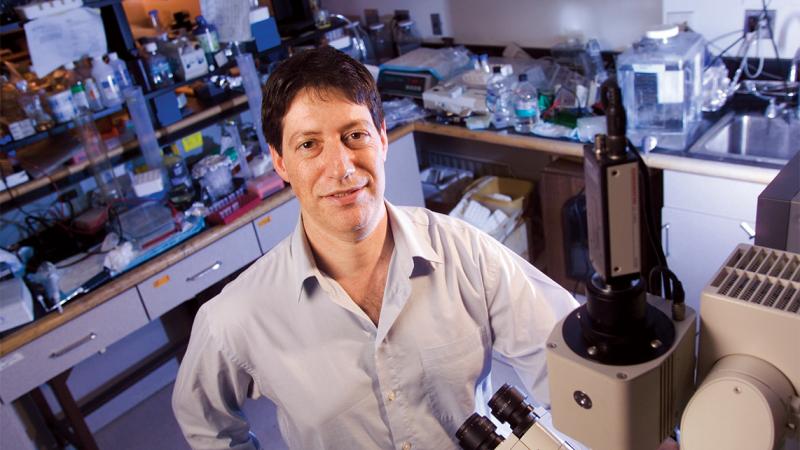June 24, 2013

Richard Gross, an expert on biocatalytic and chemical synthetic methods, has joined Rensselaer Polytechnic Institute as a chair in the Biocatalysis and Metabolic Engineering Constellation, and professor in the Department of Chemistry and Chemical Biology. Gross is currently the Herman F. Mark Chaired Professor of chemical and biomolecular engineering at the Polytechnic Institute of New York University (NYU Poly).
Gross is the first professor to hold this constellation position at Rensselaer. He will join Rensselaer July 1.
“Dr. Gross’s research emphasis is in both fundamental science and translating these advances into usable materials and products,” said Rensselaer Provost Prabhat Hajela. “He has developed environmentally safe biocatalytic methods to synthesize commercially important polymers and biomaterials for biomedical and healthcare applications. He uses high selectivity of biocatalysis to streamline reactions required to make polyesters for commercial and biomedical applications. This approach offers environmental and cost benefits over traditional chemically catalyzed polymerizations. He joins renowned biochemist Robert J. Lindhardt in this Constellation. Together they will increase Rensselaer’s strength in research and teaching related to fields of biocatalysis and metabolic engineering.”
Gross’s research seeks to use the molecular building techniques of whole cells and enzymes – “nature’s chemistry” – to create polymers, peptides, and surfactants that are useful, environmentally friendly, and economically competitive.
“It’s all about sustainability,” said Gross. “The next generation of chemistry, ‘green chemistry,’ will harness nature’s catalysts to build and modify molecules under safe and mild conditions. We take nature’s ability and redirect it toward the needs of people.”
Just as natural catalysts, such as yeast and rennet, are used to make bread and cheese, whole cells and enzymes could be used to make materials such as polymers, surfactants, and peptides. Many of the polymers, surfactants, and peptides currently found in household and commercial products like plastics, detergents, and adhesives are synthetically produced. By developing bio-derived catalysts, Gross hopes future products will be more energy efficient, non-toxic, safe to manufacture, and biodegradable.
“A critical challenge we face is to learn how these enzymes and whole cells can be used to make products that people want instead of products that are useful to the plant or microbe,” Gross said. “This often requires re-engineering enzymes and whole cells using techniques that are rapidly improving through advancements in biotechnology. My group chooses research challenges that are both fundamentally challenging and that we believe will lead to solutions desired by society.”
Current work within his lab is leading to bio-based plastics that are strong, flexible, and biodegradable; bio-erodible polymers for use in tissue engineering, drug delivery, and wound healing; biosurfactants that have antimicrobial, immune-modulatory, and oil-solubilization properties; new methods for oligopeptide synthesis; use of enzyme transformations to synthesize and modify polymers and lithography using enzymes as ink; biobased nano-fibers that could be used in durable composite materials such as wind turbine blades; and methods of biocatalysis that could be used to create materials for use in photovoltaic systems.
“In joining RPI, I look forward to enhancing the culture of interdisciplinary research, working closely with colleagues in biocatalysis, polymers, and materials science, and developing new solutions for challenges in biomedical systems,” said Gross. “Particularly exciting is the opportunity as Constellation Chair to help enhance what is already an impressive interdisciplinary environment within the Center for Biotechnology and Interdisciplinary Science.”
Gross first joined the NYU Poly in 1998 as the Herman F. Mark Chair in the Chemistry Department. He earned his doctorate in chemistry in 1986 under the guidance of Mark Green, working on problems in polymer stereochemistry at the former “Brooklyn Poly.” He then conducted postdoctoral research with Robert Lenz at University of Massachusetts at Amherst 1986-1988, working on producing polyesters using microbes. His first faculty appointment was University of Massachusetts at Lowell (1988-1998), where he rose to the rank of full professor. His bachelor’s of science is in chemistry from the University at Albany.
Constellations are multidisciplinary teams of senior faculty, rising faculty, graduate students, and undergraduates. Each constellation includes several star researchers in a particular area. Each is designed to help Rensselaer attract and retain exceptional researchers, educate students in socially important and emerging areas of research, and achieve global impact.